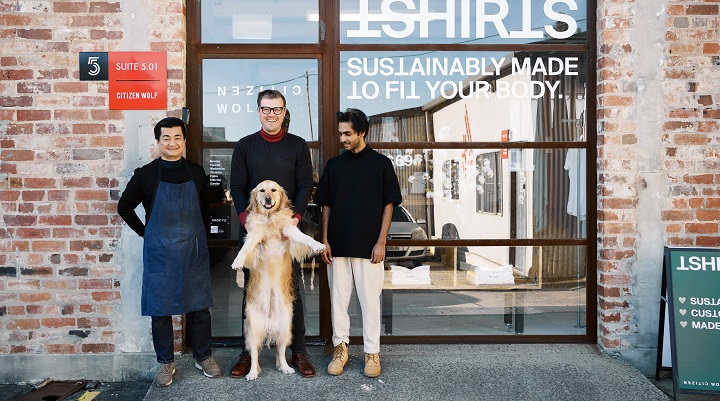Based in Sydney, Citizen Wolf is an online fashion brand making clothes differently. Instead of trying to predict demand and then having to deal with leftover products that inevitably don’t sell, it uses advanced technology to design custom-fit t-shirts and makes them to order in its factory. Co-founder Zoltan Csaki believes this is the only way to be truly sustainable in the fashion industry, and he’s not afraid to call out other brands for simply using more eco-friendly fabrics,
s, but not actually changing the way they operate — what he deems to be greenwashing.
Environmental impact guides every decision at Citizen Wolf, including how it participates — or doesn’t — in major sales events like Black Friday. For the past three years, Csaki has run Black Fridye, an initiative that invites customers to give their old clothes a new lease on life by dyeing them black, rather than buying something new.
And in January 2020, as a result of the Australian bushfire crisis, Citizen Wolf quintupled its carbon offsets, so the brand’s t-shirts are actually now carbon negative.
We recently spoke with Csaki about the role of technology in his business and how he stays committed to his vision for the brand.
Inside Retail: A lot of the equipment and techniques used to make clothes today have been in use for decades, if not longer. But Citizen Wolf takes a totally different approach. Can you describe how you use technology in your business and why?
Zoltan Csaki: Citizen Wolf is as much a tech company as we are a fashion brand, having created the algorithms and software in-house that allows us to re-engineer the way clothes are made at scale to be both custom fit and carbon negative. Even 10 years ago, it would not have been feasible to work in this way of single-piece production at scale. And in the next 10 years, we’ll be investing heavily in the next revolution around robotic sewing machines.
IR: You aren’t shy about calling out greenwashing. Can you tell me more about that?
ZC: The simple truth is that if you’re not making to order, you’re not sustainable. All the recycled poly (aka “better” material choices) in the world doesn’t change the fact that roughly one in every three garments produced goes to landfill unsold. This overproduction is the dirty secret at the heart of the industry, and whilst it continues, whatever else any brand says or does counts for nothing — aka they’re greenwashing!
IR: It’s not always easy going against the grain. How do you stay committed to your values and vision?
ZC: Every day at Citizen Wolf, we work to bring forward the sustainable future of fashion, and ensure the industry doesn’t get in the way of humanity solving the climate crisis. Working for this ideal first and the brand second is what keeps everyone motivated, regardless of title or salary.
IR: Are there any campaigns or initiatives you’ve launched recently (or coming up) that you’re particularly proud of, or that you think are really boundary pushing?
ZC: We run Black Fridye every year in lieu of the Black Friday sales. Instead of trying to convince people to buy shit they don’t need because it’s cheap, we want to extend the life of the clothes people already own by overdyeing it black – and saving the planet in the process. Black Fridye reduces carbon emissions by 95 per cent compared to buying new clothes and in 2020 we saved over 9,600kg of CO2 emissions and over 1.85 million litres of water.
IR: What can we expect to see from Citizen Wolf in the next few months?
ZC: Tees were always just our proof of concept for a better system of making clothes and very soon we’ll be expanding into other lines… watch this space!

